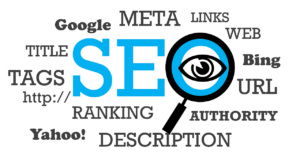Imagine you build an awesome website; it’s better than you could have even imagined. Your website goes live, and you’re eager to start receiving phone calls from interested clients. However, after days, weeks, even months, you still haven’t received calls. Why is that?! Is your website search engine friendly? If you’re not sure, it’s time to learn how to make search engine-friendly websites!
When it comes to how to make search engine-friendly websites, I can say you have many strategies to opt from. But there are some key aspects you should start with. Here are five easy tips to ensure your website ranks effortlessly in search engine results pages (SERP).
5 Ways to Make Search Engine Friendly Websites
1. Index Your Website
An index refers to the database used by a search engine. Indexes have data on all the websites that Google or other search engines were able to discover. So, you should pay close attention to this because if your website isn’t in an index, users will not be able to find it. The data in Goggle’s index determines the value of distinct keywords. Search engines use algorithms to analyze available information and establish which the most valuable content is. An index includes the URLs, content, texts, images, videos, and everything included in the URL’s HTML code.
Make sure your website is communicating with Google by connecting your website Site Map to Google Search Console. This step is often overlooked, but it’s the most important. This action tells Google, “Hey, I’m here. Come check me out!”.
2. Optimize Website Title Tags
Title tags are a small and essential part of content marketing. They influence SEO practices and have an echo on many parts of your website visibility. A title tag is a core element of HTML coding that describes to both the user and the search engine whatever the page it’s about.
On Google search results, title tags are the blue links you have to click to visit the site. But these tags appear on the tabs of your browser, too. If you don’t include title tags for your web pages, you’ll just have a messy website. As a result, you won’t be able to rank higher in search queries since it will difficult for Google bots to read and rank your content.
Remember that titles need to be different on each page. Also, refrain from copy and pasting content from one page to the next. Instead, each page is unique and each page should represent another keyword. Use keywords throughout the text in the title tags known as Heading 2, Heading 3, and so on.
3. Optimize Tag Descriptions
This is also known as meta-description. In SERPs, the meta-description is what shows up right as people are looking for you. This is your sales pitch opportunity, within 160 characters. Be sure to use all relevant keywords for maximum SEO effect.
The description tag of a web page isn’t visible on the page itself. That’s the reason why many businesses don’t pay attention to it. But when it comes to Google, description tags are a turning point for the best user experience. If your page has a description tag, Google shows it in the search result. If you don’t include such descriptions on your website, Google will reveal sentence fragments on the page that relates to the user’s query.
Even though meta-descriptions won’t contribute to your ranking, it is essential to encourage users to share your content. Some people appreciate a small brief of what you’re offering on a website.
4. Optimize Page Content.
There is no exact definition for page content. But marketers agree that useful and high-quality information offered in a relevant manner helps with engagement and SEO practices. So, if you’re asking how to make search engine-friendly websites, you should focus on content. This includes several formats, such as text, images, video, audio, or presentations. For your content to have SEO value, it needs to be beneficial to searchers.
Optimizing content should be a constant concern. This is an ongoing process that ensures you rank in search engines for relevant queries. Audience-centric content will lead to maximum attention. It would be best to research what audiences want to hear and avoid focusing on what your company wants to discuss.
Content on your website is so important for real humans to learn about your services and contact you! However, it’s also important to have a lot of content on your website for Google. Is there currently anything on your website for Google Bots to actually read? Make sure you use the right keywords, to align with what your target audience is searching for in Google. The more text you have with the right keywords, the more likely of receiving an influx of calls!
5. Eliminate Text Photos
I see a lot of websites making the mistake of posting pretty pictures, with all the text inside them. The issue with that is that Google cannot read your text! Delete all of these pretty text pictures, and have the copy directly on your website.
Indeed, visual cues are important for search engines. And you should focus on qualitative visual content, too! You should add a title for your pictures or videos, depending on the keywords relevant to your business. But I strongly advise against text-photos! These can do more harm than good!
How to Make Search Engine Friendly Websites
Make search engine-friendly sites with effective digital marketing strategies. The more pages on your website, the better. But, each web page needs strategic content like title and description, meta tag, different types of links, and unique content. Search Engine Optimization (SEO) is a strategy to communicate with search engine bots so that your website is crawled and ranked on Google. Posting regular blog posts is important to enhance how relevant Google considers your website to be. Web design, and being mobile-friendly is also important to increase user experience.
Contact an SEO Content Writer

Hire an SEO content writer for your business to rank organically, get more leads, and grow overall sales. SEO strategies are essential to ensuring your website is search engine friendly. One strategy is to post regular blog posts, at least once a week, for 4x a month. But, there is much more to consider within the world of SEO. Such as on-page SEO, off-page SEO, technical SEO and more. If digital marketing is not your specialty, and you don’t have time to write blog posts, work with an SEO consultant.
Appear on the First Page of Google
Do you want to rank your website on the first page of Google? Reach out to Kathleen Parisien for Marketing and SEO Content Writing Services. Book a free digital marketing consultation at a time most convenient to you.




